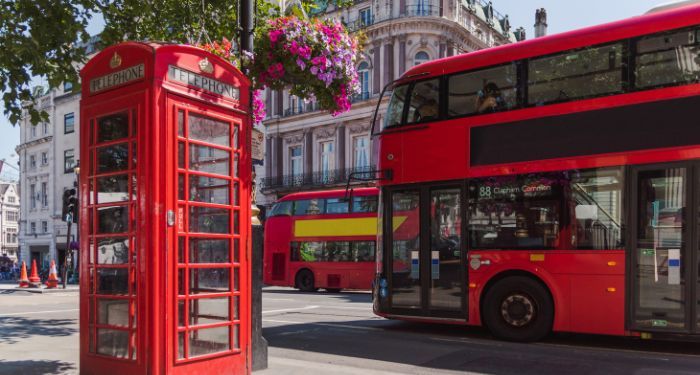I grew up reading British literature and had always harbored a desire to live in London for a while. Last year, after a casual discussion with my partner about the prospect of spending a year or two working abroad, that quickly escalated to a cross-country transfer within the organization where we both worked, along with our doggo daughter Cookie, we found ourselves in London.
Despite having read more realistic and contemporary portrayals of England and London and being aware of the country’s complicated history, my excitement and expectations of life in England were based on Enid Blyton, Jane Austen, The Great British Baking Show, The Great Interior Design Challenge, and The Great British Sewing Bee. One can, thus, imagine my disappointment when I arrived in London one not-so-fine gloomy October afternoon to find out that Londoners did not stand at street corners waiting to strike up conversations about literature, art, and gardening. We could not have chosen a worse time for our move: we moved at the onset of winter, in the wake of a severe economic downturn. I found myself disoriented, severely anxious, and unmoored, struck by a homesickness that I had never felt before despite having lived away from my hometown since I was 16.
I had come across this feeling of being an outsider in fiction before, in The Namesake by Jhumpa Lahiri or in the excellent Brick Lane by Monica Ali. But validation is not what I needed when I found myself in this situation. I needed the city to let me in on its secrets, to allow me a glimpse of its messy, complicated, cosmopolitan heart beyond mandatory trips to see the London Bridge and Big Ben, the commute to work, or weekly grocery runs in our new neighborhood. I got that first in urban fantasy and then in history books.
I read Neverwhere by Neil Gaiman at the peak of winter. I was amazed by how well this book captured the spirit of the city, all its contradictions and quirks, with good humor and compassion for the people who “fall through the cracks” in a fast-moving, often uncaring, but diverse and multicultural city. Neverwhere is dark and also optimistic and has made my tube rides many times more enjoyable. I can never look at Blackfriars and Earl’s Court the same way again. Not ready to step out of magical London yet, I picked up Kraken by China Miéville next.
The Natural History Museum was one of the first places I visited in London. Its collection fascinated me and inspired awe, wonder, curiosity, and complex feelings about the colonial history behind a large portion of the exhibits. Kraken, a book that unfolds around a giant squid stolen from the Natural History Museum, was a no-brainer reading choice for me. But I was not prepared for the wild ride it turned out to be.
While Gaiman takes us to a different, parallel London Below, Miéville’s magical London hides in plain sight — in the dark corners of its century-old streets. Kraken acknowledges the way the city’s past and present have been entwined with the history of the wider world. It is violent, gory, and deliciously weird. But despite the uninhibited strangeness of the plot, the story has got its finger firmly on the pulse of a city that is, at the same time, scary and accepting, modern and ancient. This book rendered me breathless with the innovativeness of its exploration of the nature of faith and its explosive ending — there couldn’t have been a better setting for this story.
Since reading Kraken, I have read Rivers of London by Ben Aaronovitch. I liked the descriptions of the city in this book and Toby, the accidental dog sidekick, but my enjoyment of the book was significantly hampered by the narrator’s infantile, leering gaze toward almost all the women he comes across.
These days, I walk around the streets of London with history in my ears — I listen to the brilliant Empire podcast by Anita Anand and William Dalrymple or to snippets from Peter Ackroyd’s expansive London: The Biography. I keep my eyes peeled for the blue plaques: I have walked past the site of a house Darwin lived in, the residence of suffragette princess Sophia Duleep Singh (Anita Anand’s Sophia is an enjoyable and important biography of her), and the house of suffragette and author Milicent Fawcett. I have learned of the complicated history of abolition in Britain and discovered that the Holy Trinity Church, which was at the heart of the English movement to end slave trade, is a long, pleasant walk from where I live.
When I come across colonial relics like statues of politicians and military men who were responsible for the oppression of my country and museums full of artifacts plundered from my homeland and other Asian and African countries, I feel upset and angry. I read about the ways in which people and movements from the erstwhile colonies have shaped English society, politics, and culture in books like Insurgent Empire by Priyamvada Gopal, Empireland by Sathnam Sanghera, and The Hungry Empire by Lizzie Collingham. I feel lucky to be here at a time when historians are addressing the difficult questions of the past in compelling narratives and when more and more people are questioning the legacy of their country’s colonizing past.
For me, India will always be home. But until I go back, I have learned to derive comfort from London’s unquestioning acceptance cloaked in indifference and roam the city hunting for literary and historical Easter eggs in the company of some fabulous new books.
